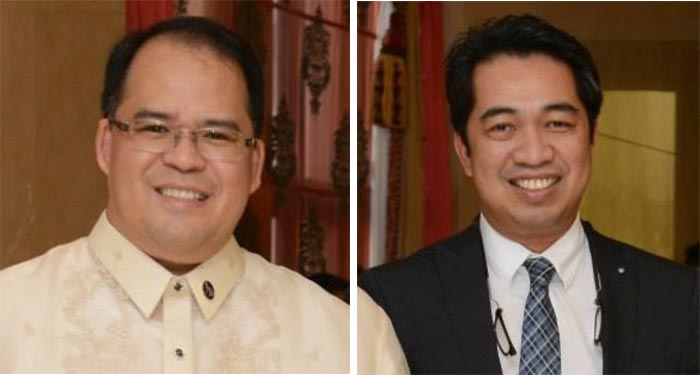Ambassador Wilfredo Santos. At right, Philippine Business Council-Qatar chairman Greg Loayon.
By Peter Alagos
Business Reporter
The Philippine embassy in Doha has warned the Overseas Filipino Worker (OFW) community to avoid participating in activities that promise “quick return on investment.”
In a circular, Ambassador Wilfredo Santos pointed to Global Intergold, which, according to Securities and Exchange Commission (SEC) in the Philippines, “is not a registered corporation or partnership” and that the entity “is the name of the discredited Emgoldex Philippines.”
In an advisory posted earlier, the SEC said it had received reports that “operators of Emgoldex Philippines are now using the name of Global Intergold to continue their online illegal investment-taking activities.”
“Per verification, Global Intergold is also not a registered corporation or partnership. Likewise, Global Intergold is not authorised to solicit investments from the public as it did not secure prior registration and/or license or permit to solicit investments from the Commission as required under Section 8.1 of the Securities Regulation Code,” the SEC advisory further said.
The ambassador stressed: “The Filipino community is therefore advised to be cautious in entertaining business opportunities promising quick return on investment. In most cases, it is difficult to distinguish legitimate networking-based operations from pyramid scams.”
The SEC also noted that “the selling agents of Global Intergold are not authorised to offer sale, sell, and solicit investments from the public since no selling agents of Global Intergold, as of now, have secured licence from the SEC to act as certified investment solicitor, investment adviser, broker or dealer in securities, or salespersons of broker or dealer in securities.”
“In view thereof, the public is hereby advised to exercise self-restraint from investing their money into such high yield, high risk investment scheme and to take the necessary precautions in dealing with the above-named entity.
“The public is further advised that those who participate including those who offer investment either personal or thru social media (e.g. Facebook, Instagram, etc.) in this investment-taking activity of Global Intergold are at risk of being prosecuted for criminal violation of the Securities Regulation Code,” the SEC emphasised.
But aside from OFWs, so-called “pyramid scams” have also victimised other members of expatriate communities here, including some Qataris, according to Philippine Business Council-Qatar (PBC-Q) chairman Greg Loayon.
“Pyramid scams have victimised Filipinos and expats alike, including Qataris. People should look at ‘get rich quick’ schemes with a wary eye. If it sounds too good to be true, it usually is,” Loayon told Gulf Times on Monday.
Asked for safety nets against investment scams, Loayon said it is important to check first if the company has the appropriate registration or licence to do business in Qatar.
“People should check with the Ministry of Economy and Commerce (MEC); for investments, there are appropriate agencies like the Qatar Central Bank (QCB), Qatar Financial Markets Authority (QFMA), or the Qatar Financial Centre (QFC).
“Foreign firms offering investment (or insurance) products in Qatar are required to have appropriate registration in the country. Otherwise, it is illegal to represent these companies in Qatar,” Loayon explained.
Ed Anami, chairman of the United Filipino Organisations in Qatar (UFOQ), said organisations under UFOQ have already been informed of the embassy circular. “To support the Philippine embassy in its efforts against these scams, we have reached out to our members through the UFOQ Facebook account,” he said.

